Entrepreneurship Report: Coco Chanel's Motivation and Characteristics
VerifiedAdded on 2023/01/06
|12
|949
|78
Report
AI Summary
This report provides an analysis of Coco Chanel's entrepreneurial practices, focusing on the application of motivation theories within her business. It examines the influence of Maslow's need hierarchy, McClelland's achievement, affiliation, and power needs, as well as Vroom's expectancy theory on employee motivation. The report further outlines key characteristics of Coco Chanel as an entrepreneur, such as her motivation, vision, passion, confidence, and decision-making processes, which contributed to her success. The report concludes by summarizing the impact of these theories and characteristics on Chanel's organizational culture and achievements. The report is a valuable resource for understanding the practical application of motivation theories in a real-world business context.
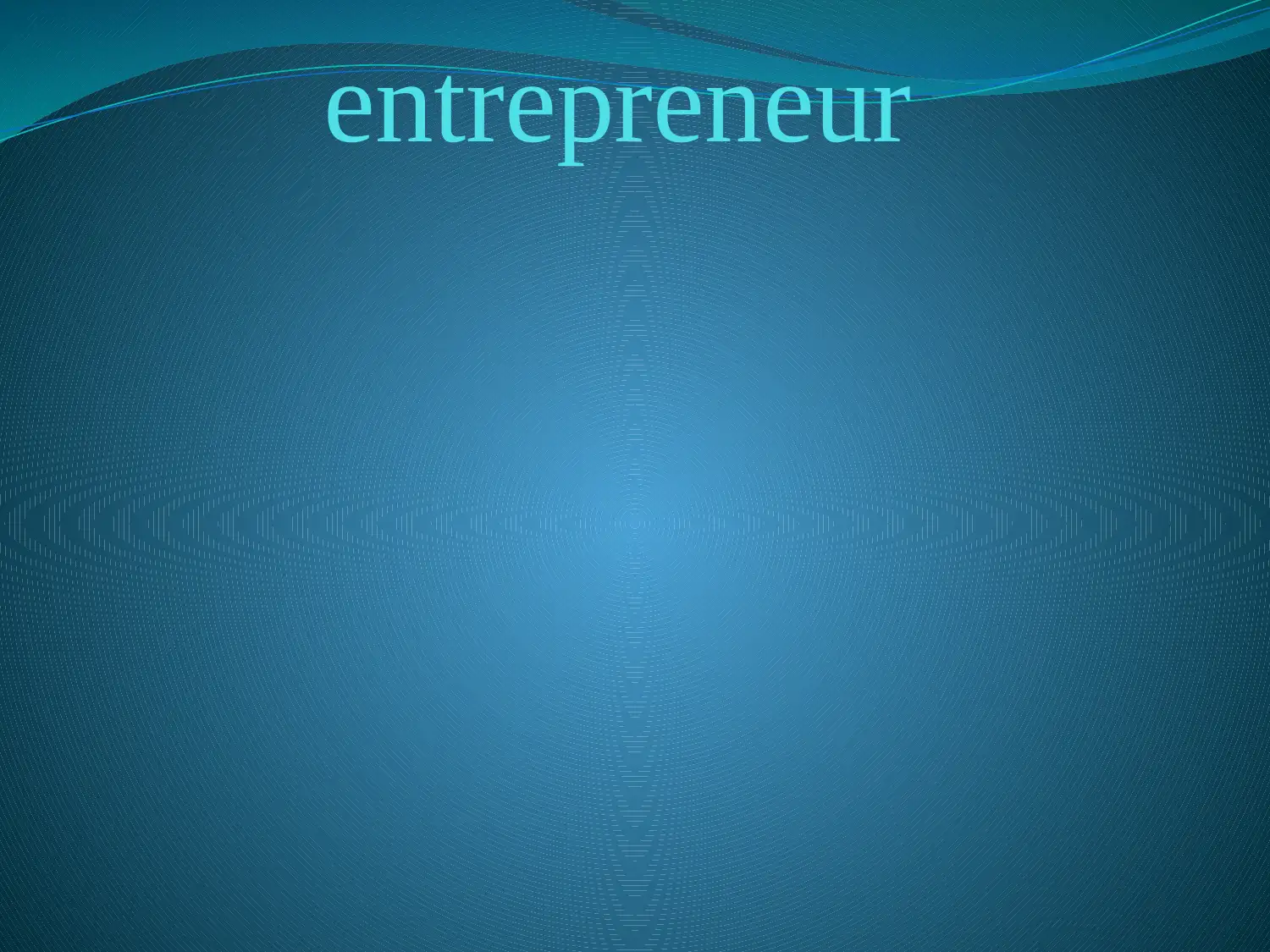
entrepreneur
Paraphrase This Document
Need a fresh take? Get an instant paraphrase of this document with our AI Paraphraser
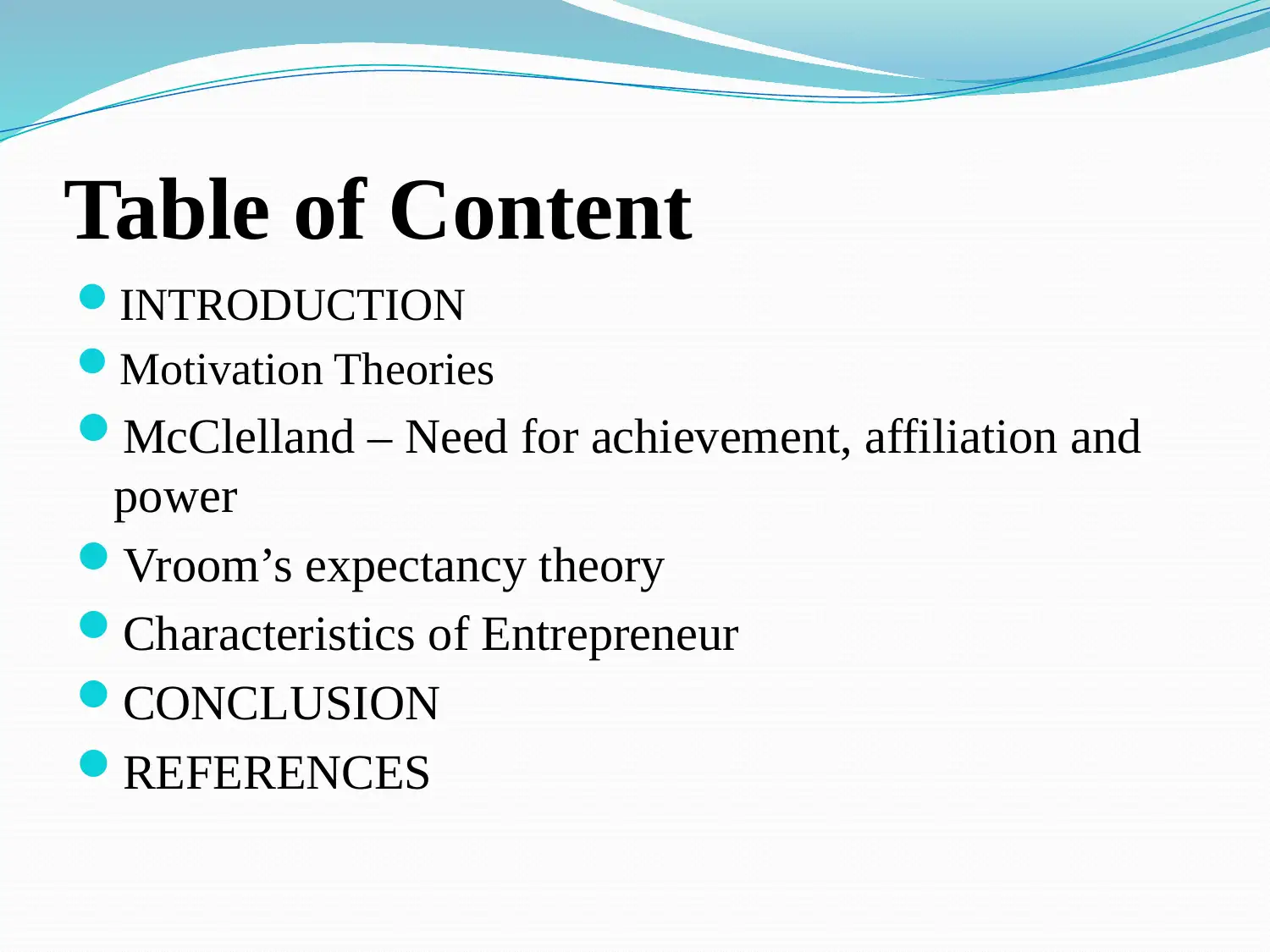
Table of Content
INTRODUCTION
Motivation Theories
McClelland – Need for achievement, affiliation and
power
Vroom’s expectancy theory
Characteristics of Entrepreneur
CONCLUSION
REFERENCES
INTRODUCTION
Motivation Theories
McClelland – Need for achievement, affiliation and
power
Vroom’s expectancy theory
Characteristics of Entrepreneur
CONCLUSION
REFERENCES
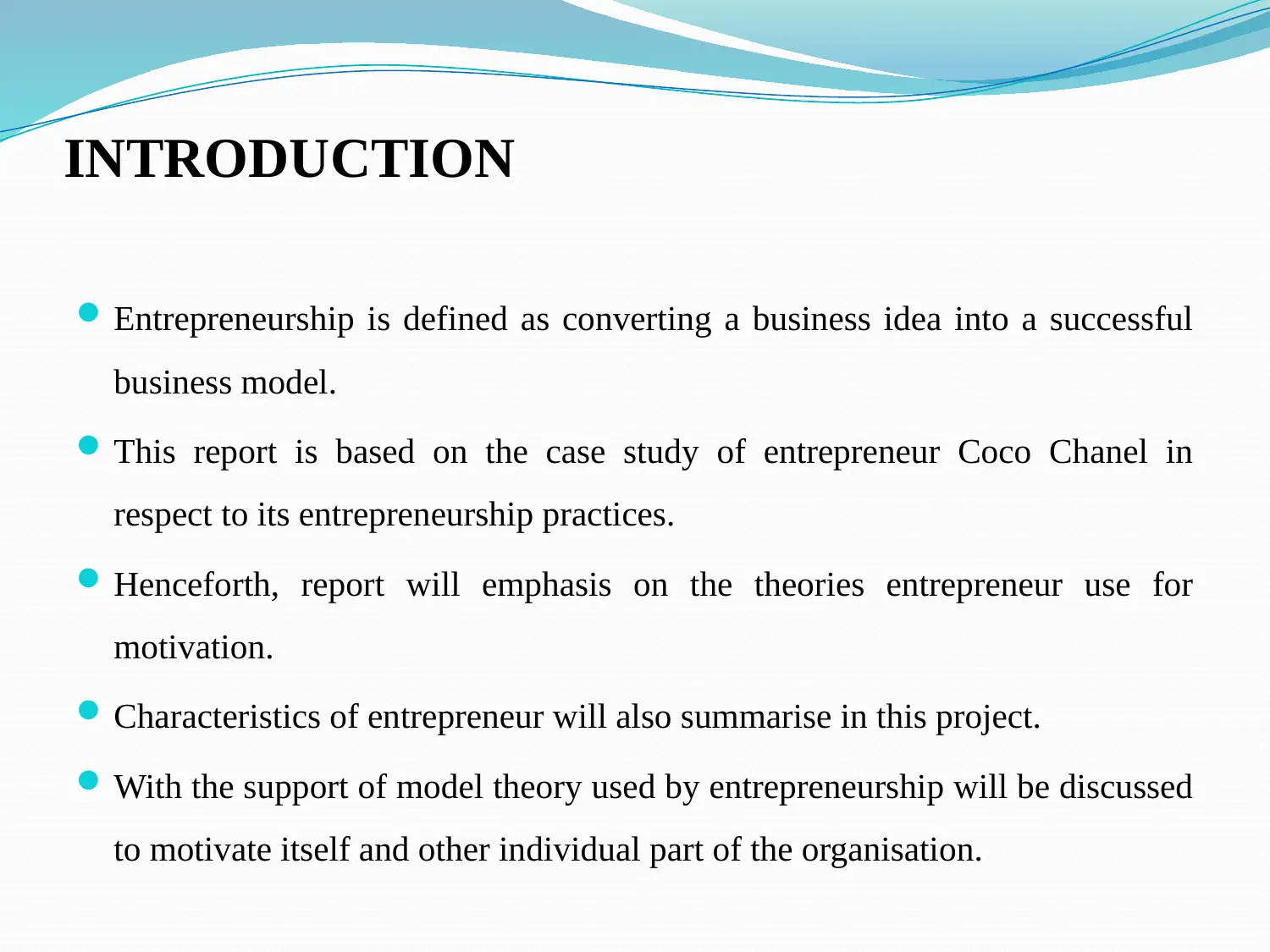
INTRODUCTION
Entrepreneurship is defined as converting a business idea into a successful
business model.
This report is based on the case study of entrepreneur Coco Chanel in
respect to its entrepreneurship practices.
Henceforth, report will emphasis on the theories entrepreneur use for
motivation.
Characteristics of entrepreneur will also summarise in this project.
With the support of model theory used by entrepreneurship will be discussed
to motivate itself and other individual part of the organisation.
Entrepreneurship is defined as converting a business idea into a successful
business model.
This report is based on the case study of entrepreneur Coco Chanel in
respect to its entrepreneurship practices.
Henceforth, report will emphasis on the theories entrepreneur use for
motivation.
Characteristics of entrepreneur will also summarise in this project.
With the support of model theory used by entrepreneurship will be discussed
to motivate itself and other individual part of the organisation.
⊘ This is a preview!⊘
Do you want full access?
Subscribe today to unlock all pages.

Trusted by 1+ million students worldwide
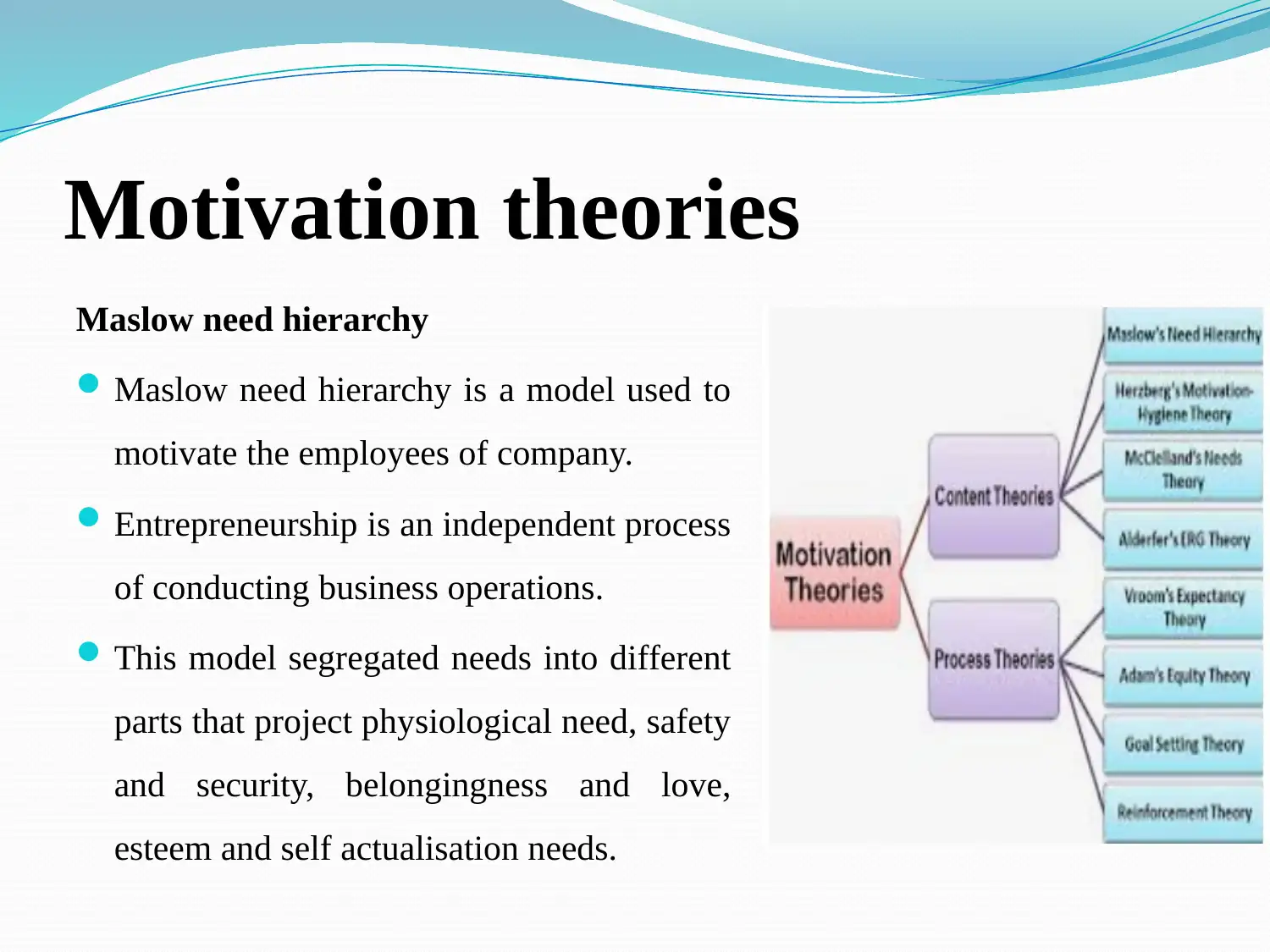
Motivation theories
Maslow need hierarchy
Maslow need hierarchy is a model used to
motivate the employees of company.
Entrepreneurship is an independent process
of conducting business operations.
This model segregated needs into different
parts that project physiological need, safety
and security, belongingness and love,
esteem and self actualisation needs.
Maslow need hierarchy
Maslow need hierarchy is a model used to
motivate the employees of company.
Entrepreneurship is an independent process
of conducting business operations.
This model segregated needs into different
parts that project physiological need, safety
and security, belongingness and love,
esteem and self actualisation needs.
Paraphrase This Document
Need a fresh take? Get an instant paraphrase of this document with our AI Paraphraser
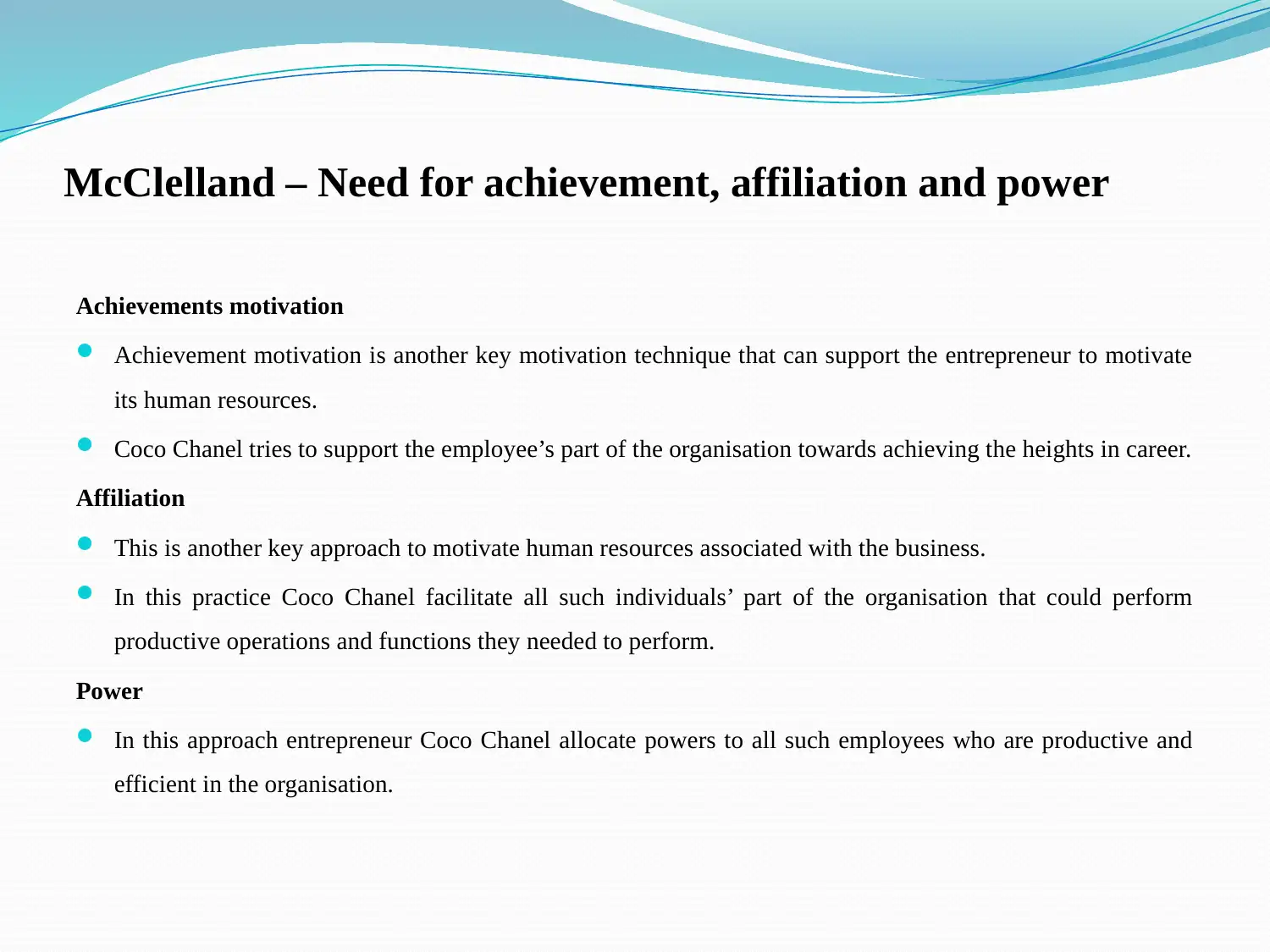
McClelland – Need for achievement, affiliation and power
Achievements motivation
Achievement motivation is another key motivation technique that can support the entrepreneur to motivate
its human resources.
Coco Chanel tries to support the employee’s part of the organisation towards achieving the heights in career.
Affiliation
This is another key approach to motivate human resources associated with the business.
In this practice Coco Chanel facilitate all such individuals’ part of the organisation that could perform
productive operations and functions they needed to perform.
Power
In this approach entrepreneur Coco Chanel allocate powers to all such employees who are productive and
efficient in the organisation.
Achievements motivation
Achievement motivation is another key motivation technique that can support the entrepreneur to motivate
its human resources.
Coco Chanel tries to support the employee’s part of the organisation towards achieving the heights in career.
Affiliation
This is another key approach to motivate human resources associated with the business.
In this practice Coco Chanel facilitate all such individuals’ part of the organisation that could perform
productive operations and functions they needed to perform.
Power
In this approach entrepreneur Coco Chanel allocate powers to all such employees who are productive and
efficient in the organisation.
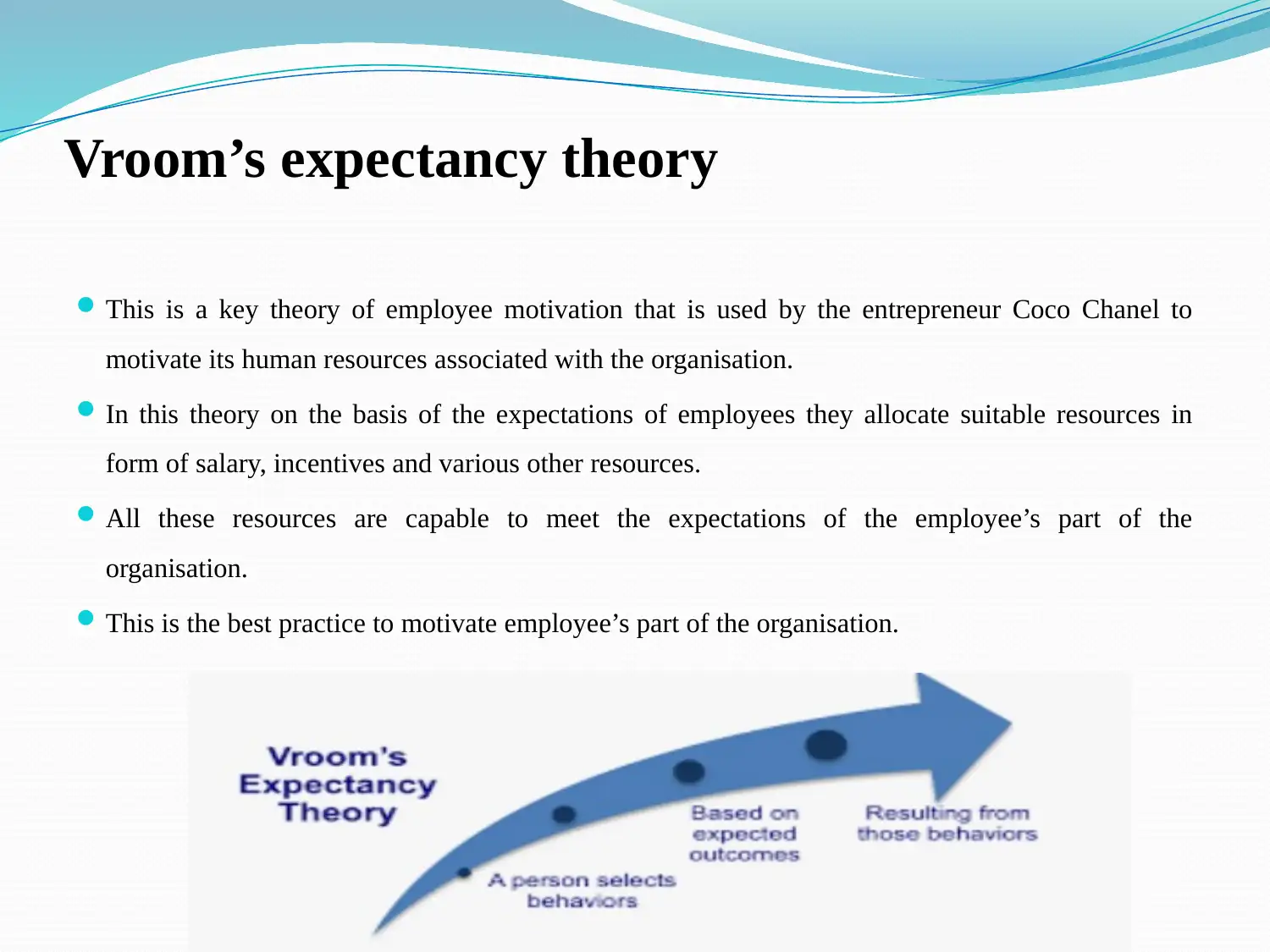
Vroom’s expectancy theory
This is a key theory of employee motivation that is used by the entrepreneur Coco Chanel to
motivate its human resources associated with the organisation.
In this theory on the basis of the expectations of employees they allocate suitable resources in
form of salary, incentives and various other resources.
All these resources are capable to meet the expectations of the employee’s part of the
organisation.
This is the best practice to motivate employee’s part of the organisation.
This is a key theory of employee motivation that is used by the entrepreneur Coco Chanel to
motivate its human resources associated with the organisation.
In this theory on the basis of the expectations of employees they allocate suitable resources in
form of salary, incentives and various other resources.
All these resources are capable to meet the expectations of the employee’s part of the
organisation.
This is the best practice to motivate employee’s part of the organisation.
⊘ This is a preview!⊘
Do you want full access?
Subscribe today to unlock all pages.

Trusted by 1+ million students worldwide
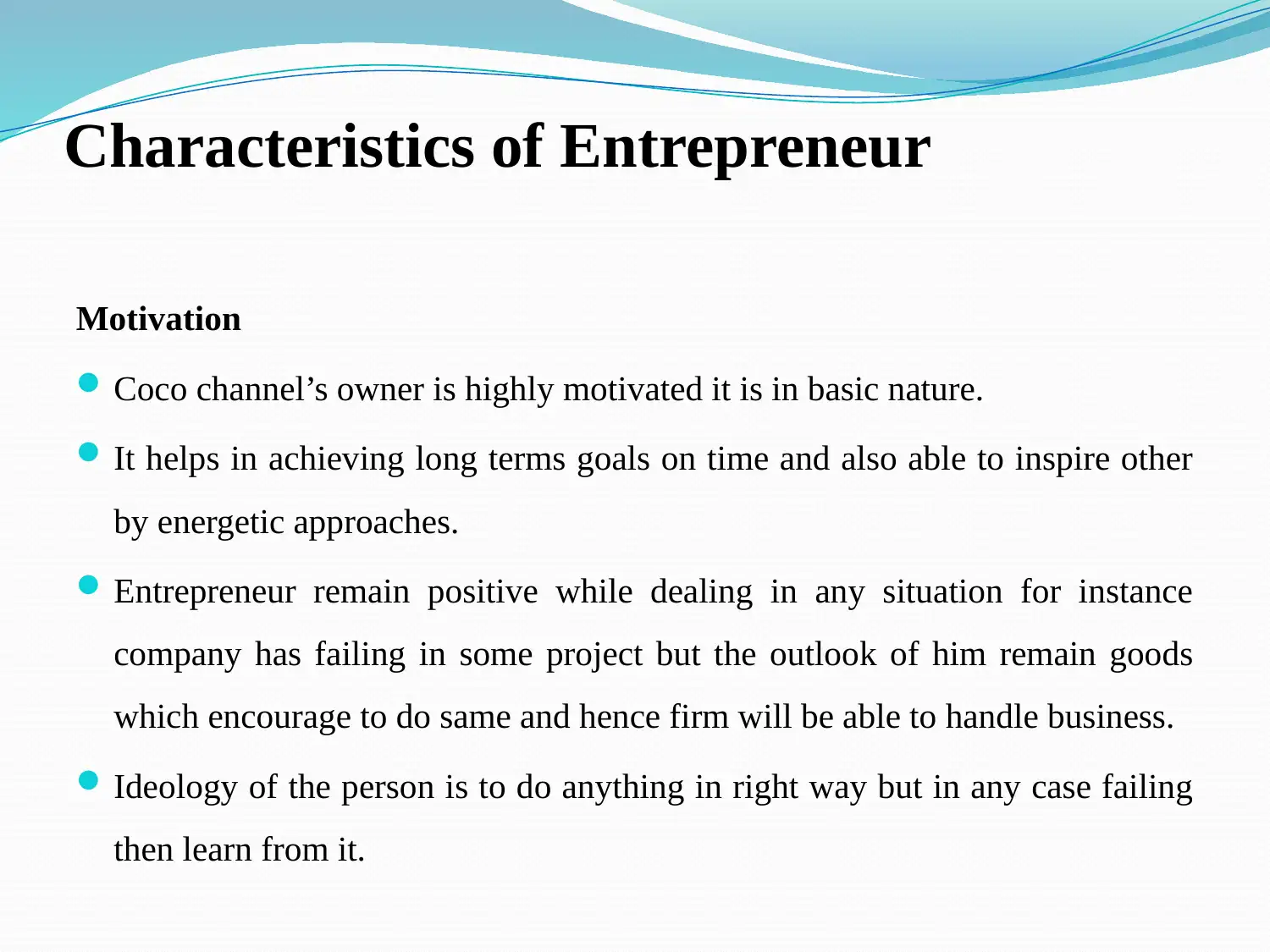
Characteristics of Entrepreneur
Motivation
Coco channel’s owner is highly motivated it is in basic nature.
It helps in achieving long terms goals on time and also able to inspire other
by energetic approaches.
Entrepreneur remain positive while dealing in any situation for instance
company has failing in some project but the outlook of him remain goods
which encourage to do same and hence firm will be able to handle business.
Ideology of the person is to do anything in right way but in any case failing
then learn from it.
Motivation
Coco channel’s owner is highly motivated it is in basic nature.
It helps in achieving long terms goals on time and also able to inspire other
by energetic approaches.
Entrepreneur remain positive while dealing in any situation for instance
company has failing in some project but the outlook of him remain goods
which encourage to do same and hence firm will be able to handle business.
Ideology of the person is to do anything in right way but in any case failing
then learn from it.
Paraphrase This Document
Need a fresh take? Get an instant paraphrase of this document with our AI Paraphraser
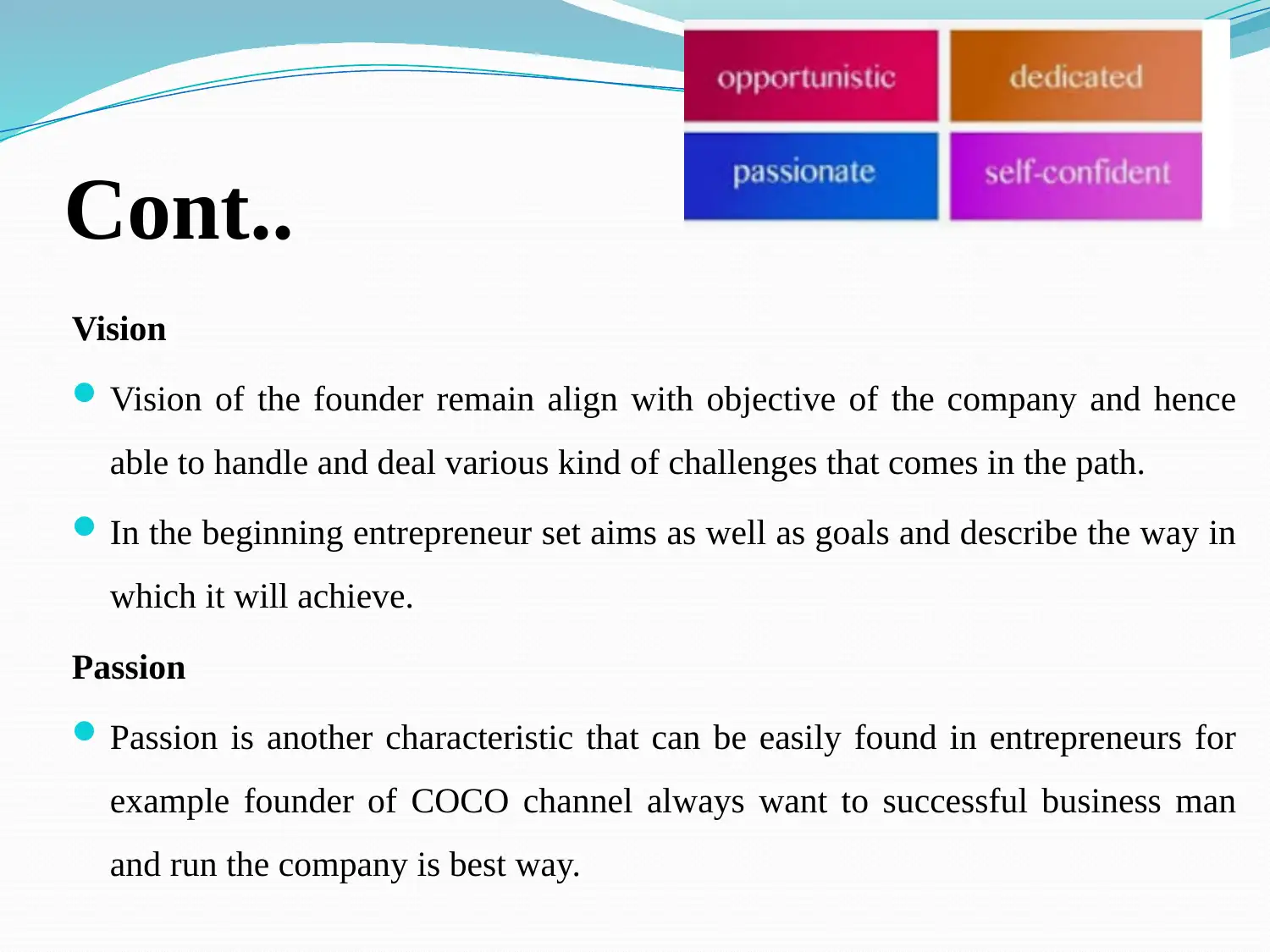
Cont..
Vision
Vision of the founder remain align with objective of the company and hence
able to handle and deal various kind of challenges that comes in the path.
In the beginning entrepreneur set aims as well as goals and describe the way in
which it will achieve.
Passion
Passion is another characteristic that can be easily found in entrepreneurs for
example founder of COCO channel always want to successful business man
and run the company is best way.
Vision
Vision of the founder remain align with objective of the company and hence
able to handle and deal various kind of challenges that comes in the path.
In the beginning entrepreneur set aims as well as goals and describe the way in
which it will achieve.
Passion
Passion is another characteristic that can be easily found in entrepreneurs for
example founder of COCO channel always want to successful business man
and run the company is best way.
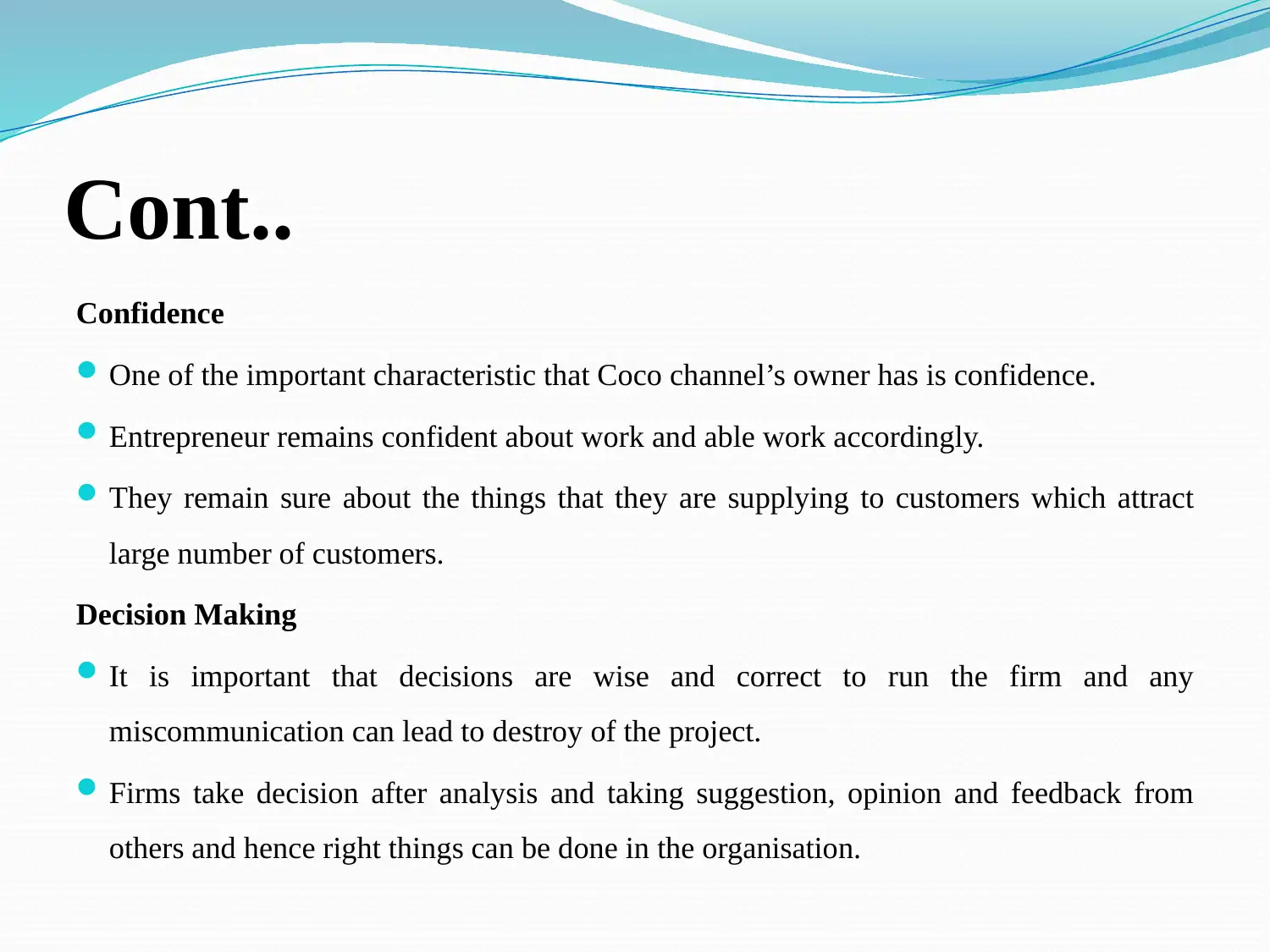
Cont..
Confidence
One of the important characteristic that Coco channel’s owner has is confidence.
Entrepreneur remains confident about work and able work accordingly.
They remain sure about the things that they are supplying to customers which attract
large number of customers.
Decision Making
It is important that decisions are wise and correct to run the firm and any
miscommunication can lead to destroy of the project.
Firms take decision after analysis and taking suggestion, opinion and feedback from
others and hence right things can be done in the organisation.
Confidence
One of the important characteristic that Coco channel’s owner has is confidence.
Entrepreneur remains confident about work and able work accordingly.
They remain sure about the things that they are supplying to customers which attract
large number of customers.
Decision Making
It is important that decisions are wise and correct to run the firm and any
miscommunication can lead to destroy of the project.
Firms take decision after analysis and taking suggestion, opinion and feedback from
others and hence right things can be done in the organisation.
⊘ This is a preview!⊘
Do you want full access?
Subscribe today to unlock all pages.

Trusted by 1+ million students worldwide
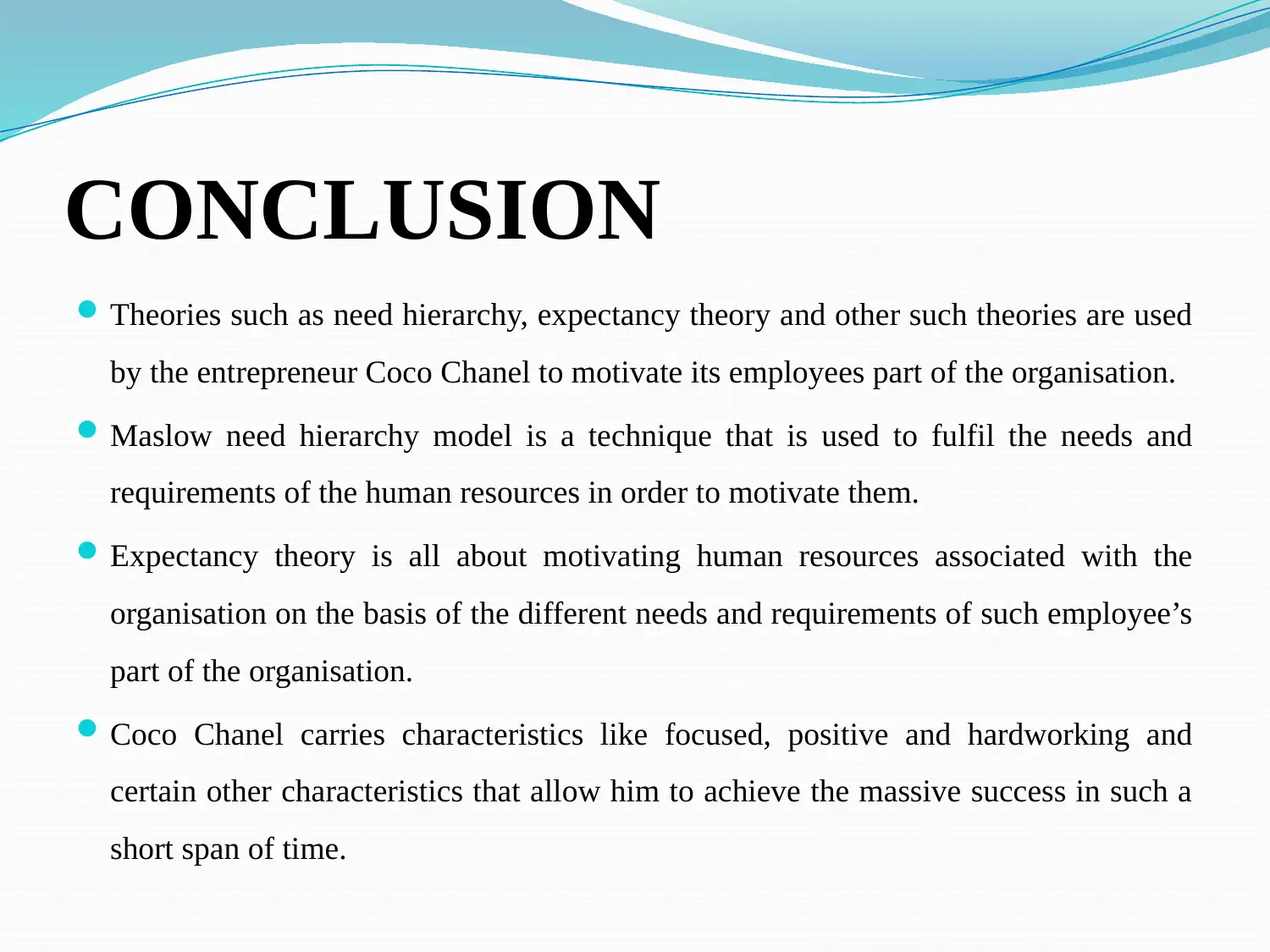
CONCLUSION
Theories such as need hierarchy, expectancy theory and other such theories are used
by the entrepreneur Coco Chanel to motivate its employees part of the organisation.
Maslow need hierarchy model is a technique that is used to fulfil the needs and
requirements of the human resources in order to motivate them.
Expectancy theory is all about motivating human resources associated with the
organisation on the basis of the different needs and requirements of such employee’s
part of the organisation.
Coco Chanel carries characteristics like focused, positive and hardworking and
certain other characteristics that allow him to achieve the massive success in such a
short span of time.
Theories such as need hierarchy, expectancy theory and other such theories are used
by the entrepreneur Coco Chanel to motivate its employees part of the organisation.
Maslow need hierarchy model is a technique that is used to fulfil the needs and
requirements of the human resources in order to motivate them.
Expectancy theory is all about motivating human resources associated with the
organisation on the basis of the different needs and requirements of such employee’s
part of the organisation.
Coco Chanel carries characteristics like focused, positive and hardworking and
certain other characteristics that allow him to achieve the massive success in such a
short span of time.
Paraphrase This Document
Need a fresh take? Get an instant paraphrase of this document with our AI Paraphraser
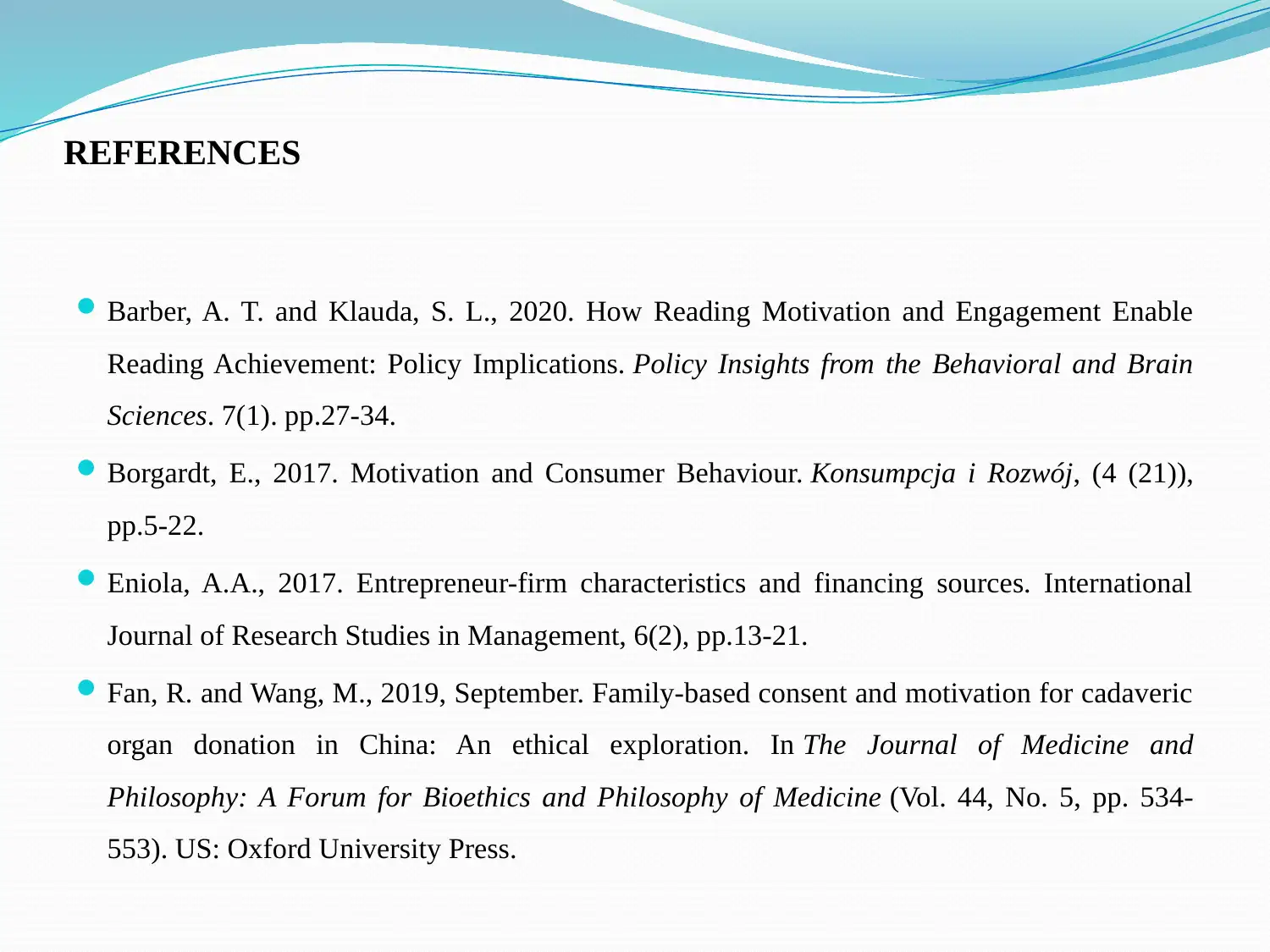
REFERENCES
Barber, A. T. and Klauda, S. L., 2020. How Reading Motivation and Engagement Enable
Reading Achievement: Policy Implications. Policy Insights from the Behavioral and Brain
Sciences. 7(1). pp.27-34.
Borgardt, E., 2017. Motivation and Consumer Behaviour. Konsumpcja i Rozwój, (4 (21)),
pp.5-22.
Eniola, A.A., 2017. Entrepreneur-firm characteristics and financing sources. International
Journal of Research Studies in Management, 6(2), pp.13-21.
Fan, R. and Wang, M., 2019, September. Family-based consent and motivation for cadaveric
organ donation in China: An ethical exploration. In The Journal of Medicine and
Philosophy: A Forum for Bioethics and Philosophy of Medicine (Vol. 44, No. 5, pp. 534-
553). US: Oxford University Press.
Barber, A. T. and Klauda, S. L., 2020. How Reading Motivation and Engagement Enable
Reading Achievement: Policy Implications. Policy Insights from the Behavioral and Brain
Sciences. 7(1). pp.27-34.
Borgardt, E., 2017. Motivation and Consumer Behaviour. Konsumpcja i Rozwój, (4 (21)),
pp.5-22.
Eniola, A.A., 2017. Entrepreneur-firm characteristics and financing sources. International
Journal of Research Studies in Management, 6(2), pp.13-21.
Fan, R. and Wang, M., 2019, September. Family-based consent and motivation for cadaveric
organ donation in China: An ethical exploration. In The Journal of Medicine and
Philosophy: A Forum for Bioethics and Philosophy of Medicine (Vol. 44, No. 5, pp. 534-
553). US: Oxford University Press.
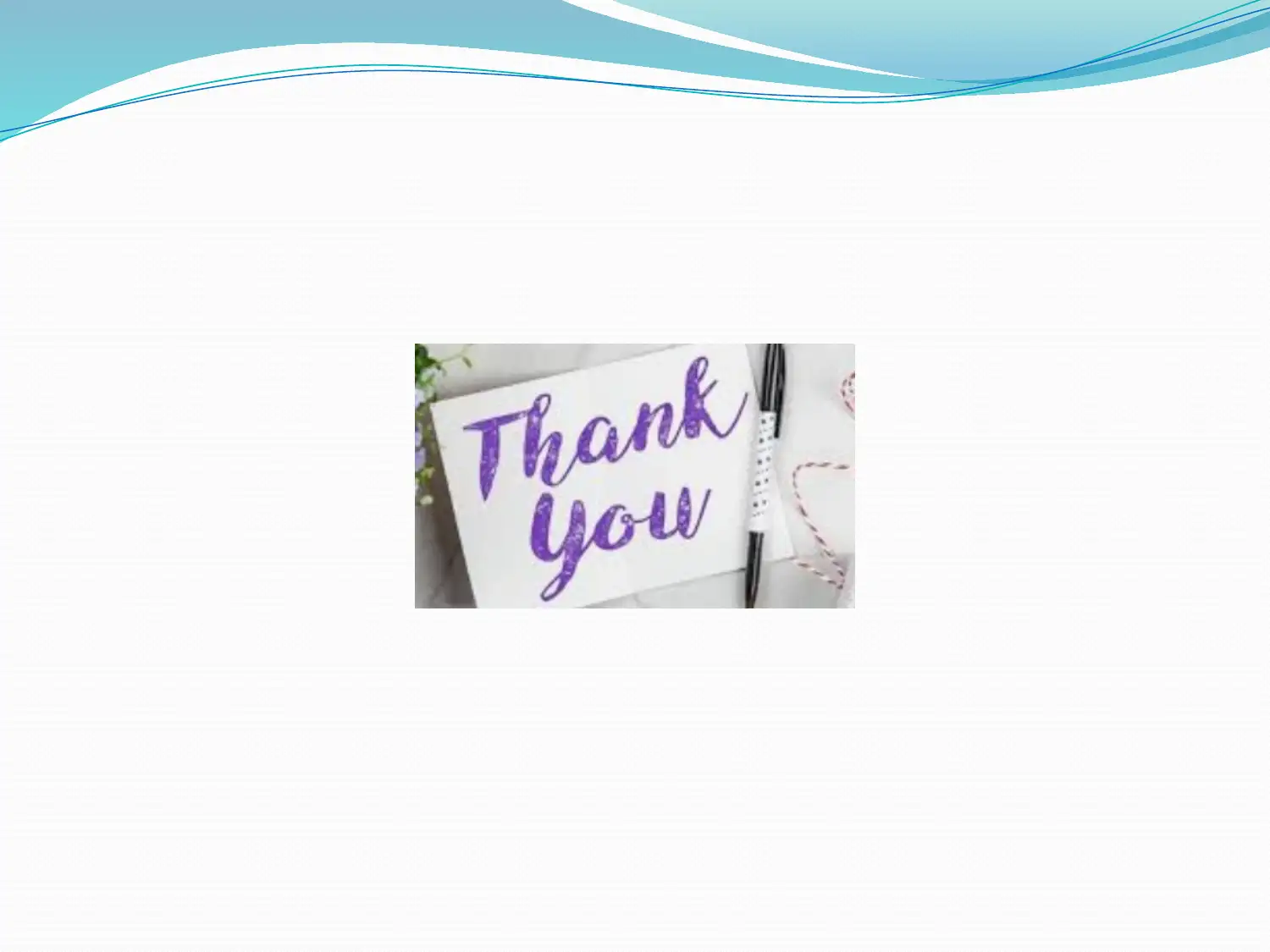
⊘ This is a preview!⊘
Do you want full access?
Subscribe today to unlock all pages.

Trusted by 1+ million students worldwide
1 out of 12
Related Documents
Your All-in-One AI-Powered Toolkit for Academic Success.
+13062052269
info@desklib.com
Available 24*7 on WhatsApp / Email
![[object Object]](/_next/static/media/star-bottom.7253800d.svg)
Unlock your academic potential
Copyright © 2020–2026 A2Z Services. All Rights Reserved. Developed and managed by ZUCOL.





